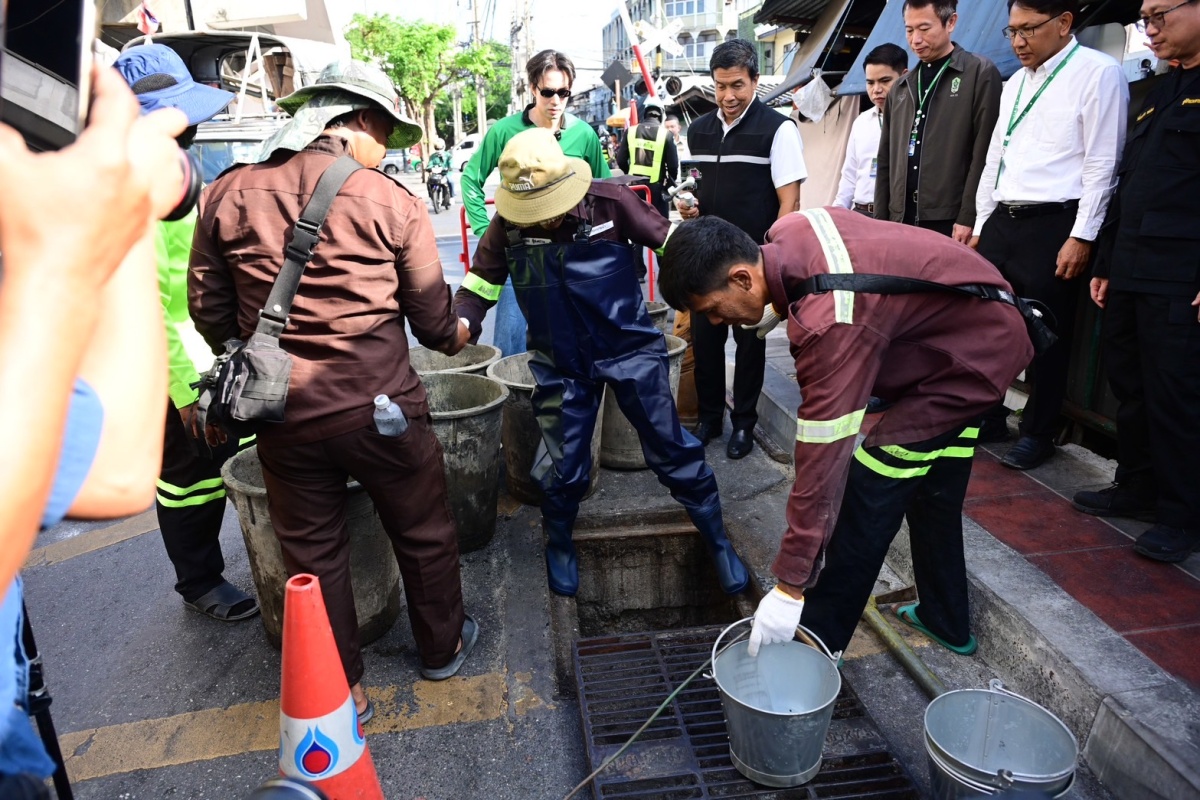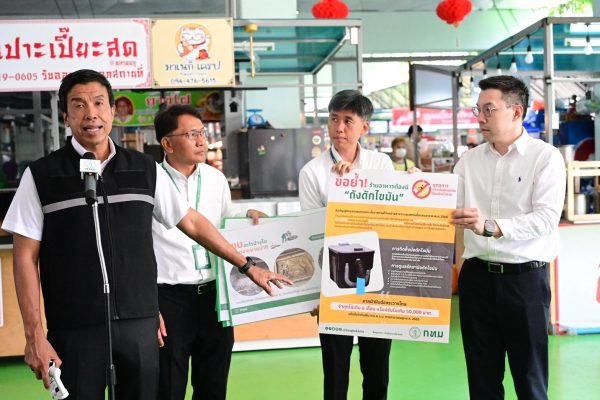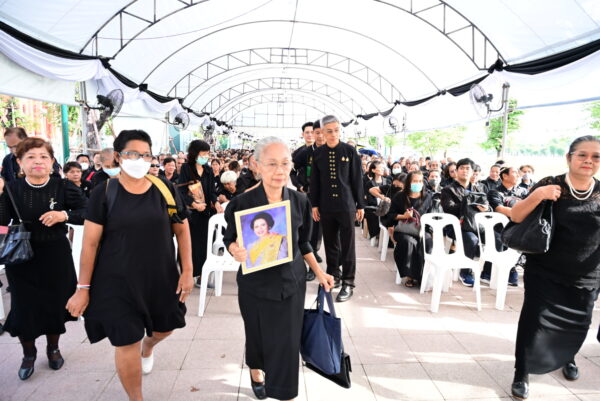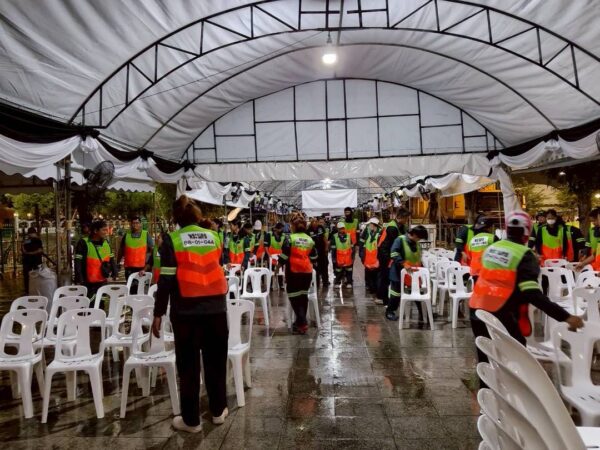(March 5, 2025) – – Governor Chadchart Sittipunt today inspected the Bangkok Metropolitan Administration’s (BMA) ongoing drainage pipe cleaning operations, part of the proactive “Operation to Eliminate Grease Blockages and Prevent Flooding”.

The inspection, conducted by the BMA’s Drainage and Sewerage Department, involved the use of sludge suction lorries and manual labour, and took place on Ratchadaphisek Road, in front of Talat Phlu Market. BMA and district officials accompanied the Governor.
Mr. Chadchart emphasised that flood preparedness is a year-round endeavour for the BMA, not solely a seasonal concern.
“Our primary focus,” he stated, “is the thorough cleansing of drainage pipes, both the smaller conduits and the major arteries, including the continuous maintenance of drainage tunnels. Bangkok’s drainage network spans approximately 6,900 kilometres, and we operate on a rotational cleaning schedule. We aim to clear roughly 3,900 to 4,000 kilometres annually. The frequency of cleaning varies according to area. Less populated zones with minimal debris are cleaned every one to two years, while high-traffic areas, such as markets, are cleaned every six months. For the 2025 plan, we have reached approximately 50% completion and anticipate full completion by May 2025, ensuring readiness for the upcoming rainy season.”
A recurring issue is the rapid re-clogging of pipes due to grease discharge from restaurants. “This grease solidifies, obstructing water flow,” the Governor explained.
“Restaurants are legally required to install grease traps before discharging wastewater. With approximately 20,000 licensed restaurants in Bangkok, we have launched the ‘Operation to Eliminate Grease Blockages and Prevent Flooding’. Over the next three months, we will inspect restaurants to ensure compliance with grease trap regulations. Non-compliant establishments will be required to make immediate improvements, failing which, stringent legal action, including imprisonment of up to six months, a fine of up to 50,000 baht, or both, will be enforced under the Public Health Act B.E. 2535. For compliant food centres, the BMA provides a grease collection and disposal service. Proper grease trapping is vital for preventing water pollution and improving drainage. The public are encouraged to report any instances of improper wastewater disposal via Traffy Fondue, and all districts will take decisive action. We are also simultaneously tackling illegal dumping in rivers and canals, having identified 23 problem canals. This initiative was launched two weeks ago.”
“I urge everyone to remain vigilant and prevent selfish individuals from jeopardising the public good,” the Governor said. “The BMA is committed to rigorous enforcement, but with the sheer number of restaurants, public cooperation is essential for the betterment of our city.”
Data from the Drainage Pipe System Division indicates that Bangkok has a total of 6,924 kilometres of drainage pipes, an increase of 108 kilometres since 2024. The 2025 fiscal year plan targets the cleaning of 3,803.6 kilometres, with 413 kilometres under the Drainage and Sewerage Department and 3,390.6 kilometres under the 50 district offices. As of 4th March 2025, 1,565.3 kilometres have been completed, representing 41.15% progress. The goal is to achieve full completion by May 2025.
Specialised cleaning is being carried out in market areas, of which 157 have been identified citywide. The BMA plans to clean these areas every three months, as they are particularly susceptible to grease accumulation, leading to flooding and unpleasant odours. Common obstructions include grease blockages in pipes and manholes, as observed on Ratchadaphisek Road near Khlong Toei Market 1, Ratchadaphisek Road near Talat Phlu Market, Sangkhom Songkhro Road, and Bang Bon 1 Road.
The Bangkok Metropolitan Administration Ordinance on Food Sales and Accumulation Sites B.E. 2565 mandates that food establishments must separate grease for disposal before discharging wastewater, using grease traps or equivalent methods. Wastewater must meet standards under the National Environmental Quality Promotion and Preservation Act. Non-compliance is punishable by imprisonment for up to six months, a fine of up to 50,000 baht, or both, under the Public Health Act B.E. 2535.
The 2025 drainage pipe cleaning plan is divided into three management strategies: 1. BMA self-operation, targeting 1,138.9 kilometres (56.8% completed). 2. Hiring the Department of Corrections, targeting 2,029.4 kilometres (34.7% completed). 3. Hiring private contractors, targeting 635.3 kilometres (33.7% completed). Monthly progress targets are: January 2025, 15%; February, 35%; March, 55%; April, 80%; and May, 100%. Current overall progress is 41.15% as of 4th March 2025.
Cleaning frequency is categorised into four periods: 1. Every six months in densely populated communities. 2. Annually in high-traffic, high-density areas. 3. Every one to two years in moderate-traffic, moderate-density areas. 4. Every two to three years in low-traffic, low-density areas.




